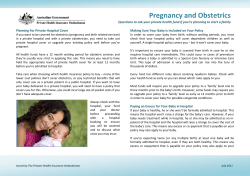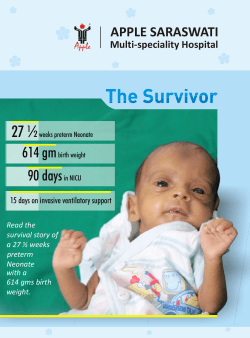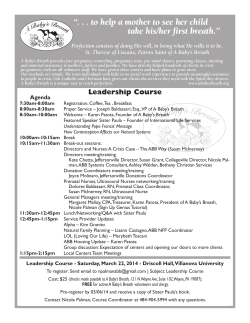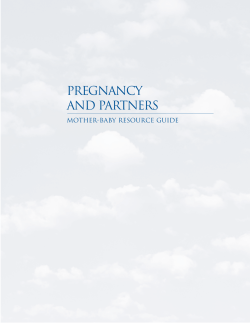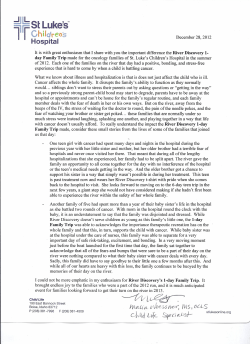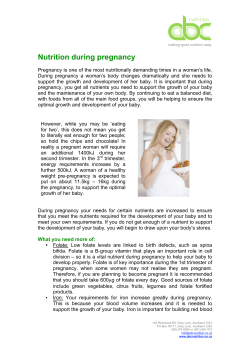
Information for parents of preterm babies less than 30 weeks gestation
Information for parents of preterm babies less than 30 weeks gestation Reading this booklet can answer some of the questions you may have about your preterm baby. Having a preterm baby can be a very stressful and frightening experience. Your baby’s health care team can help by giving you the information and support you need to understand your baby’s condition and take part in his or her care. Please feel free to ask questions and talk with your baby’s health care team members. All your questions are welcome. © Hamilton Health Sciences, 2003 PD 4877 - 09/2007 WPC\PtEd\CH\InforParentsLess30WeeksGest-lw.doc dt/September 18, 2007 2 Information for parents of preterm babies less than 30 weeks gestation What does "preterm" mean? Information for parents of preterm babies less than 30 weeks gestation Notes: "Term" refers to the length of a pregnancy. "Full-term" is the length of a complete pregnancy - 37 to 41 weeks. “Pre-term” means “before term”, that is a pregnancy less than 37 weeks. ___________________________________________________________________ A preterm or premature baby is a baby born before 37 weeks of pregnancy. The number of weeks that the baby was in the uterus is called his or her “gestational age”. In Ontario, about 1 in 12 babies is born preterm. ___________________________________________________________________ We do not always know why a baby is born preterm. We do know that the outcome for a preterm baby depends a lot on how early he or she is born. Because the body and organs of a preterm baby are not fully developed, he or she is at risk for health problems. Overall, the outcomes for preterm babies are improving, but they are still at higher risk of having health problems. ___________________________________________________________________ ___________________________________________________________________ ___________________________________________________________________ ___________________________________________________________________ ___________________________________________________________________ ___________________________________________________________________ ___________________________________________________________________ ___________________________________________________________________ 15 14 Information for parents of preterm babies less than 30 weeks gestation What follow-up care do preterm babies need? After leaving the hospital, preterm babies need to have regular visits with their family doctor or pediatrician. Depending on your baby’s needs, he or she may need tests and follow-up appointments with other specialists. Some babies who are very premature (less than 1500 gm or 3 lbs) and those with significant problems also receive care in the Neonatal Follow-up Clinic at the McMaster Children’s Hospital. The health care team at the clinic assesses your baby’s health, and keeps track of his or her growth and development. The clinic staff will continue to help you learn about your baby’s health and development. If needed, they can refer you to local services for support or treatment. Sources Information for parents of preterm babies less than 30 weeks gestation 3 What will happen during the delivery? A special team of health professionals will be in the delivery room, ready to care for your baby. As soon as your baby is born, he or she will be placed in a bed with an overhead heater. This is where your baby's colour, breathing, heart rate, reflexes and tone can be assessed immediately. Then your baby will be taken to the Neonatal Nursery in a special incubator for observation and special care. Depending on your baby's condition, this may happen very quickly. A member of the neonatal health care team will talk with you and your partner/ support person after the delivery. More information will be available after your baby's admission to the Neonatal Nursery. Your partner/support person can visit your baby in the Neonatal Nursery as soon as possible. You may visit as soon as you can, depending on your condition and care. Who is there to support me? • Adapted with permission from New South Wales Pregnancy and Newborn Services Network (2000). • Dr. N Kabra, McMaster Children’s Hospital, Hamilton Health Sciences: Guidelines on survival rates and neurosensory impairment rates according to gestational age at birth (November 2002). The staff of the Neonatal Nurseries thanks Heidi Scarfone for the drawings in this booklet. If you would like more information about this artist, please call 905-388-4329 or visit www.havingyourbaby.com We realize that this can be a very difficult and overwhelming time for families. You, your baby and your family will receive care and support from a team of health professionals. The Social Worker is a member of this team who can provide added support during your baby's stay in the Neonatal Nursery. The Social Worker can help you and your family adjust to having a preterm baby by helping you: • • • • understand information get help with finances, accommodation and other community resources find ways to support your other children manage the changes you are experiencing If you are planning to breastfeed, the Lactation Consultants from the Neonatal Nurseries will give you information and support. Your baby may not be able to feed right away so you will need to learn how to express your breastmilk. The nurses or lactation consultants will show you how to use an electric breast pump that can pump both breasts at the same time. You will need to pump your breasts regularly, as often as you would feed your baby. This helps build up a good supply of milk. 4 Information for parents of preterm babies less than 30 weeks gestation Will my baby survive? Information for parents of preterm babies less than 30 weeks gestation 13 Hearing Preterm babies have a better chance of surviving if they are cared for in a Neonatal Intensive Care Unit. If there is a risk that your baby may be born early, arrangements may be made for the mother to be transferred to deliver at a hospital that offers this specialized care for the mother and baby. By 28 weeks a preterm baby can hear voices. The baby will respond more to voices than other sounds. He or she may startle to loud noises. If hearing develops normally, preterm babies can hear and respond to voices at 31 to 34 weeks gestation. As each baby is unique, the outcomes for each baby will be different. The outcome for your baby will depend on many things such as: All preterm babies born in Ontario have a hearing assessment. This is a simple test to tell if a baby has hearing loss. Hearing loss can delay or prevent a baby from learning to talk and understand language. Your baby may have this test while he or she is in the neonatal nursery. • age - the number of weeks of the pregnancy • weight at birth • maturity - how far your baby’s body systems have developed • health - whether your baby is sick or has abnormalities A few babies are so small, immature or sick that we cannot keep them alive, despite all the care and treatment that is available. This chart shows the survival rates for babies delivered at McMaster Children’s Hospital. Completed weeks of gestation age Babies surviving in the NICU 22 weeks 0% 23 weeks 35% 24 weeks 55% 25 weeks 75% 26 weeks 80% 27 weeks 90% 28 weeks 93% > 29 weeks 95% The highest risk period for not surviving is in the first weeks after birth. Although the risk is lower, death can occur after this time. Babies born less than 26 weeks gestation are at greatest risk. Every year in Ontario about 4 out of 1000 babies are born deaf or with a hearing problem. High-risk babies in neonatal intensive care have a slightly higher likelihood of deafness or hearing loss. For those babies born at 26 weeks gestation or earlier, less than 2% may develop hearing loss. Learning problems Premature infants less than 1500 gm (3 lbs) at birth and some other high-risk infants have a greater risk of having difficulties with thinking (cognitive abilities) during preschool and school age. This can include reading, writing or mathematics. As many as 60% of babies born at less than 26 weeks gestation may have learning problems. In addition, about 25% of children born at or less than 26 weeks gestation have IQ scores in the low or borderline range of normal. These children need extra remedial help at school and some of them may require a special program to meet their needs. Newborn screening All babies born in Ontario have a Newborn Screening blood test in the first few days of life. This test is done by taking a few drops of blood from the baby’s heel. Newborn Screening checks for many rare health problems, called disorders. If these problems are found early, they can be treated. 12 Information for parents of preterm babies less than 30 weeks gestation Vision By 28 weeks gestation a baby can see shadows and movements, but cannot see clearly yet. He or she may blink at bright lights. At first, a preterm baby may only open his or her eyes for a short time and not seem to focus on anything. As vision develops, a baby can see best 8 to 10 inches from his or her face. Babies seem to prefer black and white pictures as colour vision does not develop until the baby is a couple of months old. Babies born before 32 weeks gestation have immature eyes and may develop a disease called Retinopathy of Prematurity or ROP. This is more common in the very sick and very small preterm baby. An eye specialist called an Ophthalmologist will carefully check your baby's eyes in the nursery and will continue to do this after your baby leaves the neonatal nursery. Sometimes special arrangements are made for your baby to return to the eye specialist for eye exams after he or she has been transferred to the community hospital's nursery. About 50 to 60% of very preterm babies (less than 26 weeks gestation) may need to wear glasses and are at greater risk of developing minor eye problems such as a "lazy eye" (amblyopia) or a "wandering" eye (strabismus). In a few babies (less than 2%), severe ROP can lead to blindness. It is very important that any eye problems be recognized early so that this does not interfere with your baby's general development. The average age for the diagnosis of severe vision loss for an infant is between 36 weeks to two months corrected age. Information for parents of preterm babies less than 30 weeks gestation 5 What are some of the problems that can occur in preterm infants? Preterm babies are not fully developed. They may not be mature enough to control body temperature, breathe on their own or feed by sucking. They are at greater risk for health problems such as: • • • • • • breathing problems temperature problems feeding problems bleeding into the brain jaundice infections Breathing problems A baby's lungs are not fully developed until about 36 weeks. Most babies born before 30 weeks gestation will need some help with breathing. Some babies need extra oxygen. Others may also need a breathing machine called a ventilator to help with breathing. A baby may need help with a ventilator right after birth or hours later, if he or she develops trouble with breathing. If severe ROP develops, the ophthalmologist may need to do laser treatment of the affected eye(s) to reduce the risk of blindness. About 3 to 5% of babies born at or before 26 weeks will require laser treatment. Regular eye examinations are important • All premature infants should also have their vision assessed before they go to school and during the school years to see if they need to wear glasses. • Babies who develop ROP should have their eyes checked each year, even through the teenage years, to check for vision loss. Some babies need the ventilator for just a few days. Others, particularly the more immature babies, may need this help for many weeks. In a few babies, the lungs are so immature that we cannot get enough oxygen into the blood stream to keep them alive despite all of the treatments we have available. 6 Information for parents of preterm babies less than 30 weeks gestation As well as immature lungs, preterm babies may not have enough surfactant. Surfactant is the natural substance that coats the inside of the air sacs (alveoli) in the baby’s lungs and keeps them inflated. Artificial surfactant can be given to babies to coat the lungs and make breathing easier. The breathing problem caused by immature lungs or lack of surfactant is called Respiratory Distress Syndrome or RDS. The part of the brain that controls breathing is not fully developed until about 36 weeks gestation. This can cause pauses in breathing called apnea. Your baby’s breathing will be closely monitored. Apnea usually goes away as the baby matures, but some babies need treatment with medication. Temperature problems Preterm babies have difficulty controlling their body temperature. The part of the brain that controls body temperature is not fully developed and these babies have very little body fat to keep them warm. As a result, preterm babies can lose heat very quickly and it takes a long time to warm them up again. We can help your baby stay warm by putting a hat on your baby’s head and by warming the air in the incubator. Information for parents of preterm babies less than 30 weeks gestation Muscle tone and movement A preterm baby’s muscles are not fully developed so they are weak. The baby may lay quietly stretched out. When the baby moves, the movements look shaky and weak. Preterm babies may sleep most of the time. This helps them conserve energy for growth. Some babies have trouble sleeping soundly and may easily be disturbed by noise, handling and activity. In the first few months, premature infants can have problems with too little or too much muscle tone. This may affect the way your baby moves his arms and legs. These problems usually disappear during the first year of life. Your baby may be referred to a special therapist in your community who will assess your baby and help with his or her development. Sometimes there is a permanent muscle tone problem, called cerebral palsy. The diagnosis of cerebral palsy can be made between 9 to 18 months corrected age. Cerebral palsy may occur in less than 10% of babies born at or before 26 weeks gestation. This is a broad term and can range from mild limitations such as an awkward gait, to the need of assistive devices such as braces or walkers. Very few children with cerebral palsy are not able to walk at all. 11 10 Information for parents of preterm babies less than 30 weeks gestation What should I know about a preterm baby’s development? Many preterm babies grow and develop without any problems at all. However, some babies born very early may have lasting health problems. They may develop learning, behavioural or physical disabilities. In general, the lower the gestational age, the greater the risk of disability. Some problems with development and learning may not be found until the child is older. Information for parents of preterm babies less than 30 weeks gestation 7 Feeding problems Babies born before 30 weeks gestation need help with feeding. They are not mature enough to suck and swallow well or may not tolerate breastmilk or formula. Depending on their age and condition, there are many ways to help preterm babies get the nutrition they need such as: • giving nutrition through a vein in a special intravenous solution called total parenteral nutrition • feeding breastmilk or formula through a soft plastic tube put through the baby’s nose into the stomach, called gavage feeding • adding extra vitamins and minerals • giving a special formula made for preterm babies, if breastmilk is not available As preterm babies mature and their condition improves, they can try breastfeeding around 32 to 33 weeks gestation. “Corrected age” When looking at your child's developmental progress you need to make allowance for your child's prematurity by using his or her "corrected age". Corrected age is the child's actual age minus the number of weeks that he or she was born early. Corrected age is used because normal development relates to when a baby was due to be born, rather than the birth date. As each year goes by, the difference between actual and corrected age becomes less important. For infants born before 32 weeks gestation, "corrected age" should be used until about 3 years. 8 Information for parents of preterm babies less than 30 weeks gestation Bleeding into the brain Some of the blood vessels in the brain of a premature baby are fragile. These blood vessels are sensitive to changes in blood flow and can easily break. This causes bruising or bleeding within the ventricles, the spaces near the center of the brain, which are usually filled with clear fluid. Bleeding inside the brain is called intraventricular hemorrhage or IVH. Most often there is only a small area of bleeding which does not cause symptoms or damage the brain. In a small number of babies, the area of bleeding is bigger and this can cause brain damage or death. The brain bleeding may affect the baby’s physical development, in ways such as cerebral palsy (see page 11 for more information). If your baby is at risk for this problem, he or she will have an ultrasound scan of the brain done at the end of the first week. The ultrasound scan makes a picture of the brain, which shows the area of fragile blood vessels. Results of the ultrasound scan can tell if any bleeding has occurred. Your baby's doctor will discuss the results of this test with you. Jaundice Preterm babies have a greater chance of getting jaundice. Jaundice is a build up of bilirubin in the bloodstream. Bilirubin is formed as red blood cells break down. As the baby's body breaks down red blood cells that are no longer needed, the bilirubin is released into the blood. The bilirubin must be removed from the blood by the liver. If there is a lot of bilirubin in the blood, or the baby's liver is not mature enough to remove the bilirubin, the baby becomes jaundiced. If the bilirubin level becomes very high, it can damage the baby’s brain. To tell if there is jaundice, the amount of bilirubin is measured in a small sample of blood. Jaundice can be seen by a yellow colour of the baby's skin and the white part of the eyes. Sometimes jaundice gets better without any treatment. However, if the bilirubin level gets too high, the baby may need phototherapy. This treatment involves shining a special set of lights on the baby's skin while protecting the baby’s eyes. The lights help to break down the bilirubin. Information for parents of preterm babies less than 30 weeks gestation 9 Infections The immune system, which is needed to fight against infections, is not fully developed in preterm babies. Therefore, the babies can get infections easily. Preterm babies may develop one or more infections while in the Neonatal Nursery. Most of these infections respond to treatment with antibiotics. Occasionally the infection is so serious that the baby may not survive. How long do preterm babies stay in hospital? Generally, preterm babies stay in hospital until about the time they were due to be born, about 38 weeks of pregnancy. This may be longer if there have been problems during your baby's hospital stay. What usually determines a baby's length of stay is his or her ability to feed by sucking, to grow and to maintain his or her temperature in a crib. Your baby may go home or be transferred to another nursery. Your baby's care team will make these plans with you. If you were transferred from another hospital, we will try to transfer your baby back when he or she no longer requires our special facilities. Preterm babies sometimes have trouble breathing when they are in a car seat. So preterm babies are tested in their car seat before their first ride home. If your baby is transferred to another nursery, the test can be done at that hospital. You will most likely be discharged from the hospital before your baby is ready to leave. Being separated from your baby can be distressing. You can keep in touch by calling or visiting the nursery as often as you can. The Social Worker can help you if you are from out of town and need to find a place to stay near the hospital. If your baby is transferred to a hospital closer to home you can visit more often. Transferring babies who are doing well to their community hospitals makes sure that we have intensive care beds available for other very sick babies. 8 Information for parents of preterm babies less than 30 weeks gestation Bleeding into the brain Some of the blood vessels in the brain of a premature baby are fragile. These blood vessels are sensitive to changes in blood flow and can easily break. This causes bruising or bleeding within the ventricles, the spaces near the center of the brain, which are usually filled with clear fluid. Bleeding inside the brain is called intraventricular hemorrhage or IVH. Most often there is only a small area of bleeding which does not cause symptoms or damage the brain. In a small number of babies, the area of bleeding is bigger and this can cause brain damage or death. The brain bleeding may affect the baby’s physical development, in ways such as cerebral palsy (see page 11 for more information). If your baby is at risk for this problem, he or she will have an ultrasound scan of the brain done at the end of the first week. The ultrasound scan makes a picture of the brain, which shows the area of fragile blood vessels. Results of the ultrasound scan can tell if any bleeding has occurred. Your baby's doctor will discuss the results of this test with you. Jaundice Preterm babies have a greater chance of getting jaundice. Jaundice is a build up of bilirubin in the bloodstream. Bilirubin is formed as red blood cells break down. As the baby's body breaks down red blood cells that are no longer needed, the bilirubin is released into the blood. The bilirubin must be removed from the blood by the liver. If there is a lot of bilirubin in the blood, or the baby's liver is not mature enough to remove the bilirubin, the baby becomes jaundiced. If the bilirubin level becomes very high, it can damage the baby’s brain. To tell if there is jaundice, the amount of bilirubin is measured in a small sample of blood. Jaundice can be seen by a yellow colour of the baby's skin and the white part of the eyes. Sometimes jaundice gets better without any treatment. However, if the bilirubin level gets too high, the baby may need phototherapy. This treatment involves shining a special set of lights on the baby's skin while protecting the baby’s eyes. The lights help to break down the bilirubin. Information for parents of preterm babies less than 30 weeks gestation 9 Infections The immune system, which is needed to fight against infections, is not fully developed in preterm babies. Therefore, the babies can get infections easily. Preterm babies may develop one or more infections while in the Neonatal Nursery. Most of these infections respond to treatment with antibiotics. Occasionally the infection is so serious that the baby may not survive. How long do preterm babies stay in hospital? Generally, preterm babies stay in hospital until about the time they were due to be born, about 38 weeks of pregnancy. This may be longer if there have been problems during your baby's hospital stay. What usually determines a baby's length of stay is his or her ability to feed by sucking, to grow and to maintain his or her temperature in a crib. Your baby may go home or be transferred to another nursery. Your baby's care team will make these plans with you. If you were transferred from another hospital, we will try to transfer your baby back when he or she no longer requires our special facilities. Preterm babies sometimes have trouble breathing when they are in a car seat. So preterm babies are tested in their car seat before their first ride home. If your baby is transferred to another nursery, the test can be done at that hospital. You will most likely be discharged from the hospital before your baby is ready to leave. Being separated from your baby can be distressing. You can keep in touch by calling or visiting the nursery as often as you can. The Social Worker can help you if you are from out of town and need to find a place to stay near the hospital. If your baby is transferred to a hospital closer to home you can visit more often. Transferring babies who are doing well to their community hospitals makes sure that we have intensive care beds available for other very sick babies. 10 Information for parents of preterm babies less than 30 weeks gestation What should I know about a preterm baby’s development? Many preterm babies grow and develop without any problems at all. However, some babies born very early may have lasting health problems. They may develop learning, behavioural or physical disabilities. In general, the lower the gestational age, the greater the risk of disability. Some problems with development and learning may not be found until the child is older. Information for parents of preterm babies less than 30 weeks gestation 7 Feeding problems Babies born before 30 weeks gestation need help with feeding. They are not mature enough to suck and swallow well or may not tolerate breastmilk or formula. Depending on their age and condition, there are many ways to help preterm babies get the nutrition they need such as: • giving nutrition through a vein in a special intravenous solution called total parenteral nutrition • feeding breastmilk or formula through a soft plastic tube put through the baby’s nose into the stomach, called gavage feeding • adding extra vitamins and minerals • giving a special formula made for preterm babies, if breastmilk is not available As preterm babies mature and their condition improves, they can try breastfeeding around 32 to 33 weeks gestation. “Corrected age” When looking at your child's developmental progress you need to make allowance for your child's prematurity by using his or her "corrected age". Corrected age is the child's actual age minus the number of weeks that he or she was born early. Corrected age is used because normal development relates to when a baby was due to be born, rather than the birth date. As each year goes by, the difference between actual and corrected age becomes less important. For infants born before 32 weeks gestation, "corrected age" should be used until about 3 years. 6 Information for parents of preterm babies less than 30 weeks gestation As well as immature lungs, preterm babies may not have enough surfactant. Surfactant is the natural substance that coats the inside of the air sacs (alveoli) in the baby’s lungs and keeps them inflated. Artificial surfactant can be given to babies to coat the lungs and make breathing easier. The breathing problem caused by immature lungs or lack of surfactant is called Respiratory Distress Syndrome or RDS. The part of the brain that controls breathing is not fully developed until about 36 weeks gestation. This can cause pauses in breathing called apnea. Your baby’s breathing will be closely monitored. Apnea usually goes away as the baby matures, but some babies need treatment with medication. Temperature problems Preterm babies have difficulty controlling their body temperature. The part of the brain that controls body temperature is not fully developed and these babies have very little body fat to keep them warm. As a result, preterm babies can lose heat very quickly and it takes a long time to warm them up again. We can help your baby stay warm by putting a hat on your baby’s head and by warming the air in the incubator. Information for parents of preterm babies less than 30 weeks gestation Muscle tone and movement A preterm baby’s muscles are not fully developed so they are weak. The baby may lay quietly stretched out. When the baby moves, the movements look shaky and weak. Preterm babies may sleep most of the time. This helps them conserve energy for growth. Some babies have trouble sleeping soundly and may easily be disturbed by noise, handling and activity. In the first few months, premature infants can have problems with too little or too much muscle tone. This may affect the way your baby moves his arms and legs. These problems usually disappear during the first year of life. Your baby may be referred to a special therapist in your community who will assess your baby and help with his or her development. Sometimes there is a permanent muscle tone problem, called cerebral palsy. The diagnosis of cerebral palsy can be made between 9 to 18 months corrected age. Cerebral palsy may occur in less than 10% of babies born at or before 26 weeks gestation. This is a broad term and can range from mild limitations such as an awkward gait, to the need of assistive devices such as braces or walkers. Very few children with cerebral palsy are not able to walk at all. 11 12 Information for parents of preterm babies less than 30 weeks gestation Vision By 28 weeks gestation a baby can see shadows and movements, but cannot see clearly yet. He or she may blink at bright lights. At first, a preterm baby may only open his or her eyes for a short time and not seem to focus on anything. As vision develops, a baby can see best 8 to 10 inches from his or her face. Babies seem to prefer black and white pictures as colour vision does not develop until the baby is a couple of months old. Babies born before 32 weeks gestation have immature eyes and may develop a disease called Retinopathy of Prematurity or ROP. This is more common in the very sick and very small preterm baby. An eye specialist called an Ophthalmologist will carefully check your baby's eyes in the nursery and will continue to do this after your baby leaves the neonatal nursery. Sometimes special arrangements are made for your baby to return to the eye specialist for eye exams after he or she has been transferred to the community hospital's nursery. About 50 to 60% of very preterm babies (less than 26 weeks gestation) may need to wear glasses and are at greater risk of developing minor eye problems such as a "lazy eye" (amblyopia) or a "wandering" eye (strabismus). In a few babies (less than 2%), severe ROP can lead to blindness. It is very important that any eye problems be recognized early so that this does not interfere with your baby's general development. The average age for the diagnosis of severe vision loss for an infant is between 36 weeks to two months corrected age. Information for parents of preterm babies less than 30 weeks gestation 5 What are some of the problems that can occur in preterm infants? Preterm babies are not fully developed. They may not be mature enough to control body temperature, breathe on their own or feed by sucking. They are at greater risk for health problems such as: • • • • • • breathing problems temperature problems feeding problems bleeding into the brain jaundice infections Breathing problems A baby's lungs are not fully developed until about 36 weeks. Most babies born before 30 weeks gestation will need some help with breathing. Some babies need extra oxygen. Others may also need a breathing machine called a ventilator to help with breathing. A baby may need help with a ventilator right after birth or hours later, if he or she develops trouble with breathing. If severe ROP develops, the ophthalmologist may need to do laser treatment of the affected eye(s) to reduce the risk of blindness. About 3 to 5% of babies born at or before 26 weeks will require laser treatment. Regular eye examinations are important • All premature infants should also have their vision assessed before they go to school and during the school years to see if they need to wear glasses. • Babies who develop ROP should have their eyes checked each year, even through the teenage years, to check for vision loss. Some babies need the ventilator for just a few days. Others, particularly the more immature babies, may need this help for many weeks. In a few babies, the lungs are so immature that we cannot get enough oxygen into the blood stream to keep them alive despite all of the treatments we have available. 4 Information for parents of preterm babies less than 30 weeks gestation Will my baby survive? Information for parents of preterm babies less than 30 weeks gestation 13 Hearing Preterm babies have a better chance of surviving if they are cared for in a Neonatal Intensive Care Unit. If there is a risk that your baby may be born early, arrangements may be made for the mother to be transferred to deliver at a hospital that offers this specialized care for the mother and baby. By 28 weeks a preterm baby can hear voices. The baby will respond more to voices than other sounds. He or she may startle to loud noises. If hearing develops normally, preterm babies can hear and respond to voices at 31 to 34 weeks gestation. As each baby is unique, the outcomes for each baby will be different. The outcome for your baby will depend on many things such as: All preterm babies born in Ontario have a hearing assessment. This is a simple test to tell if a baby has hearing loss. Hearing loss can delay or prevent a baby from learning to talk and understand language. Your baby may have this test while he or she is in the neonatal nursery. • age - the number of weeks of the pregnancy • weight at birth • maturity - how far your baby’s body systems have developed • health - whether your baby is sick or has abnormalities A few babies are so small, immature or sick that we cannot keep them alive, despite all the care and treatment that is available. This chart shows the survival rates for babies delivered at McMaster Children’s Hospital. Completed weeks of gestation age Babies surviving in the NICU 22 weeks 0% 23 weeks 35% 24 weeks 55% 25 weeks 75% 26 weeks 80% 27 weeks 90% 28 weeks 93% > 29 weeks 95% The highest risk period for not surviving is in the first weeks after birth. Although the risk is lower, death can occur after this time. Babies born less than 26 weeks gestation are at greatest risk. Every year in Ontario about 4 out of 1000 babies are born deaf or with a hearing problem. High-risk babies in neonatal intensive care have a slightly higher likelihood of deafness or hearing loss. For those babies born at 26 weeks gestation or earlier, less than 2% may develop hearing loss. Learning problems Premature infants less than 1500 gm (3 lbs) at birth and some other high-risk infants have a greater risk of having difficulties with thinking (cognitive abilities) during preschool and school age. This can include reading, writing or mathematics. As many as 60% of babies born at less than 26 weeks gestation may have learning problems. In addition, about 25% of children born at or less than 26 weeks gestation have IQ scores in the low or borderline range of normal. These children need extra remedial help at school and some of them may require a special program to meet their needs. Newborn screening All babies born in Ontario have a Newborn Screening blood test in the first few days of life. This test is done by taking a few drops of blood from the baby’s heel. Newborn Screening checks for many rare health problems, called disorders. If these problems are found early, they can be treated. 14 Information for parents of preterm babies less than 30 weeks gestation What follow-up care do preterm babies need? After leaving the hospital, preterm babies need to have regular visits with their family doctor or pediatrician. Depending on your baby’s needs, he or she may need tests and follow-up appointments with other specialists. Some babies who are very premature (less than 1500 gm or 3 lbs) and those with significant problems also receive care in the Neonatal Follow-up Clinic at the McMaster Children’s Hospital. The health care team at the clinic assesses your baby’s health, and keeps track of his or her growth and development. The clinic staff will continue to help you learn about your baby’s health and development. If needed, they can refer you to local services for support or treatment. Sources Information for parents of preterm babies less than 30 weeks gestation 3 What will happen during the delivery? A special team of health professionals will be in the delivery room, ready to care for your baby. As soon as your baby is born, he or she will be placed in a bed with an overhead heater. This is where your baby's colour, breathing, heart rate, reflexes and tone can be assessed immediately. Then your baby will be taken to the Neonatal Nursery in a special incubator for observation and special care. Depending on your baby's condition, this may happen very quickly. A member of the neonatal health care team will talk with you and your partner/ support person after the delivery. More information will be available after your baby's admission to the Neonatal Nursery. Your partner/support person can visit your baby in the Neonatal Nursery as soon as possible. You may visit as soon as you can, depending on your condition and care. Who is there to support me? • Adapted with permission from New South Wales Pregnancy and Newborn Services Network (2000). • Dr. N Kabra, McMaster Children’s Hospital, Hamilton Health Sciences: Guidelines on survival rates and neurosensory impairment rates according to gestational age at birth (November 2002). The staff of the Neonatal Nurseries thanks Heidi Scarfone for the drawings in this booklet. If you would like more information about this artist, visit http://heidiscarfone.com We realize that this can be a very difficult and overwhelming time for families. You, your baby and your family will receive care and support from a team of health professionals. The Social Worker is a member of this team who can provide added support during your baby's stay in the Neonatal Nursery. The Social Worker can help you and your family adjust to having a preterm baby by helping you: • • • • understand information get help with finances, accommodation and other community resources find ways to support your other children manage the changes you are experiencing If you are planning to breastfeed, the Lactation Consultants from the Neonatal Nurseries will give you information and support. Your baby may not be able to feed right away so you will need to learn how to express your breastmilk. The nurses or lactation consultants will show you how to use an electric breast pump that can pump both breasts at the same time. You will need to pump your breasts regularly, as often as you would feed your baby. This helps build up a good supply of milk. 2 Information for parents of preterm babies less than 30 weeks gestation What does "preterm" mean? Information for parents of preterm babies less than 30 weeks gestation Notes: "Term" refers to the length of a pregnancy. "Full-term" is the length of a complete pregnancy - 37 to 41 weeks. “Pre-term” means “before term”, that is a pregnancy less than 37 weeks. ___________________________________________________________________ A preterm or premature baby is a baby born before 37 weeks of pregnancy. The number of weeks that the baby was in the uterus is called his or her “gestational age”. In Ontario, about 1 in 12 babies is born preterm. ___________________________________________________________________ We do not always know why a baby is born preterm. We do know that the outcome for a preterm baby depends a lot on how early he or she is born. Because the body and organs of a preterm baby are not fully developed, he or she is at risk for health problems. Overall, the outcomes for preterm babies are improving, but they are still at higher risk of having health problems. ___________________________________________________________________ ___________________________________________________________________ ___________________________________________________________________ ___________________________________________________________________ ___________________________________________________________________ ___________________________________________________________________ ___________________________________________________________________ ___________________________________________________________________ 15 Information for parents of preterm babies less than 30 weeks gestation Reading this booklet can answer some of the questions you may have about your preterm baby. Having a preterm baby can be a very stressful and frightening experience. Your baby’s health care team can help by giving you the information and support you need to understand your baby’s condition and take part in his or her care. Please feel free to ask questions and talk with your baby’s health care team members. All your questions are welcome. © Hamilton Health Sciences, 2003 PD 4877 - 09/2007 WPC\PtEd\CH\InforParentsLess30WeeksGest-lw.doc dt/September 18, 2007
© Copyright 2025
